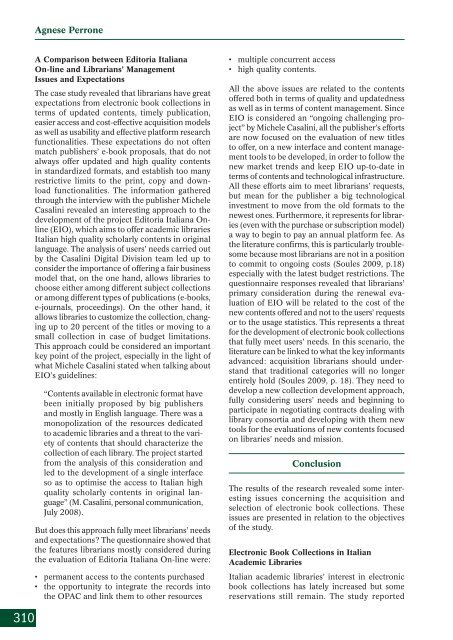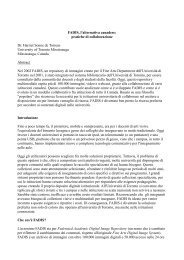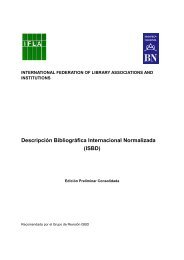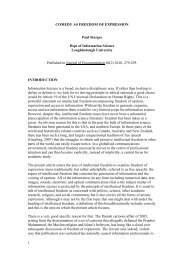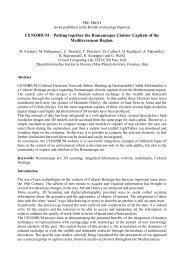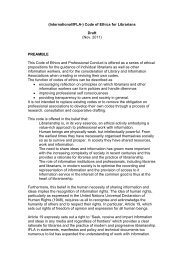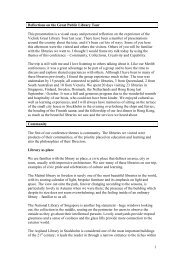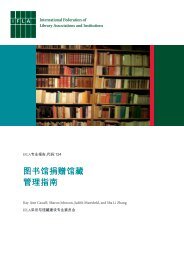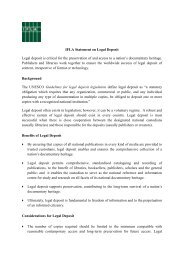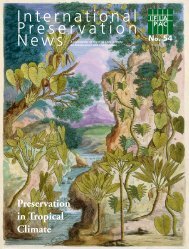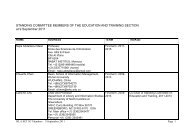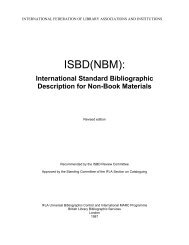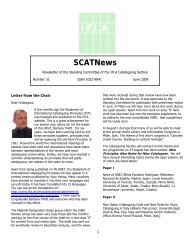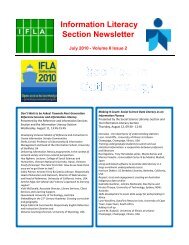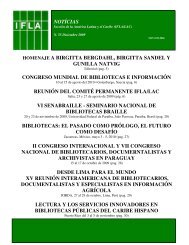World Library and Information Congress, Milan, 2009 - IFLA
World Library and Information Congress, Milan, 2009 - IFLA
World Library and Information Congress, Milan, 2009 - IFLA
You also want an ePaper? Increase the reach of your titles
YUMPU automatically turns print PDFs into web optimized ePapers that Google loves.
310<br />
Agnese Perrone<br />
A Comparison between Editoria Italiana<br />
On-line <strong>and</strong> Librarians’ Management<br />
Issues <strong>and</strong> Expectations<br />
The case study revealed that librarians have great<br />
expectations from electronic book collections in<br />
terms of updated contents, timely publication,<br />
easier access <strong>and</strong> cost-effective acquisition models<br />
as well as usability <strong>and</strong> effective platform research<br />
functionalities. These expectations do not often<br />
match publishers’ e-book proposals, that do not<br />
always offer updated <strong>and</strong> high quality contents<br />
in st<strong>and</strong>ardized formats, <strong>and</strong> establish too many<br />
restrictive limits to the print, copy <strong>and</strong> download<br />
functionalities. The information gathered<br />
through the interview with the publisher Michele<br />
Casalini revealed an interesting approach to the<br />
development of the project Editoria Italiana Online<br />
(EIO), which aims to offer academic libraries<br />
Italian high quality scholarly contents in original<br />
language. The analysis of users’ needs carried out<br />
by the Casalini Digital Division team led up to<br />
consider the importance of offering a fair business<br />
model that, on the one h<strong>and</strong>, allows libraries to<br />
choose either among different subject collections<br />
or among different types of publications (e-books,<br />
e-journals, proceedings). On the other h<strong>and</strong>, it<br />
allows libraries to customize the collection, changing<br />
up to 20 percent of the titles or moving to a<br />
small collection in case of budget limitations.<br />
This approach could be considered an important<br />
key point of the project, especially in the light of<br />
what Michele Casalini stated when talking about<br />
EIO’s guidelines:<br />
“Contents available in electronic format have<br />
been initially proposed by big publishers<br />
<strong>and</strong> mostly in English language. There was a<br />
monopolization of the resources dedicated<br />
to academic libraries <strong>and</strong> a threat to the variety<br />
of contents that should characterize the<br />
collection of each library. The project started<br />
from the analysis of this consideration <strong>and</strong><br />
led to the development of a single interface<br />
so as to optimise the access to Italian high<br />
quality scholarly contents in original language”<br />
(M. Casalini, personal communication,<br />
July 2008).<br />
But does this approach fully meet librarians’ needs<br />
<strong>and</strong> expectations? The questionnaire showed that<br />
the features librarians mostly considered during<br />
the evaluation of Editoria Italiana On-line were:<br />
• permanent access to the contents purchased<br />
• the opportunity to integrate the records into<br />
the OPAC <strong>and</strong> link them to other resources<br />
• multiple concurrent access<br />
• high quality contents.<br />
All the above issues are related to the contents<br />
offered both in terms of quality <strong>and</strong> updatedness<br />
as well as in terms of content management. Since<br />
EIO is considered an “ongoing challenging project”<br />
by Michele Casalini, all the publisher’s efforts<br />
are now focused on the evaluation of new titles<br />
to offer, on a new interface <strong>and</strong> content management<br />
tools to be developed, in order to follow the<br />
new market trends <strong>and</strong> keep EIO up-to-date in<br />
terms of contents <strong>and</strong> technological infrastructure.<br />
All these efforts aim to meet librarians’ requests,<br />
but mean for the publisher a big technological<br />
investment to move from the old formats to the<br />
newest ones. Furthermore, it represents for libraries<br />
(even with the purchase or subscription model)<br />
a way to begin to pay an annual platform fee. As<br />
the literature confi rms, this is particularly troublesome<br />
because most librarians are not in a position<br />
to commit to ongoing costs (Soules <strong>2009</strong>, p.18)<br />
especially with the latest budget restrictions. The<br />
questionnaire responses revealed that librarians’<br />
primary consideration during the renewal evaluation<br />
of EIO will be related to the cost of the<br />
new contents offered <strong>and</strong> not to the users’ requests<br />
or to the usage statistics. This represents a threat<br />
for the development of electronic book collections<br />
that fully meet users’ needs. In this scenario, the<br />
literature can be linked to what the key informants<br />
advanced: acquisition librarians should underst<strong>and</strong><br />
that traditional categories will no longer<br />
entirely hold (Soules <strong>2009</strong>, p. 18). They need to<br />
develop a new collection development approach,<br />
fully considering users’ needs <strong>and</strong> beginning to<br />
participate in negotiating contracts dealing with<br />
library consortia <strong>and</strong> developing with them new<br />
tools for the evaluations of new contents focused<br />
on libraries’ needs <strong>and</strong> mission.<br />
Conclusion<br />
The results of the research revealed some interesting<br />
issues concerning the acquisition <strong>and</strong><br />
selection of electronic book collections. These<br />
issues are presented in relation to the objectives<br />
of the study.<br />
Electronic Book Collections in Italian<br />
Academic Libraries<br />
Italian academic libraries’ interest in electronic<br />
book collections has lately increased but some<br />
reservations still remain. The study reported


